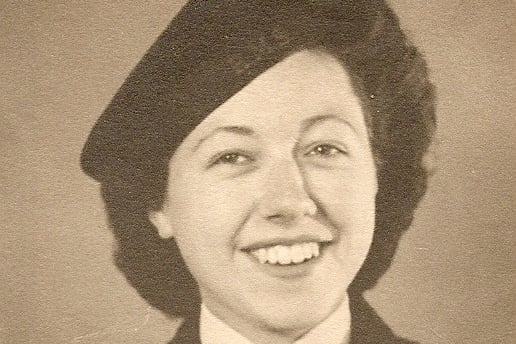In August 1944 Kathleen Oates - a Wren assigned to the Women's Royal Naval Service during the Second World War - was transferred to the Isle of Man. During her time on the island, she wrote dozens of letters to home which provide a unique commentary on the operations at Ronaldsway and what life was like on the Isle of Man 80 years ago. Her daughter, CHRISTINE SMITH, pores through her mother’s letters as part of a series of columns based on Kathleen Oates’s writing...
This week, 80 years ago, Wren Kathleen Oates did not write her happiest letter home. She wasn’t quite sure what to make of her new life on the Isle of Man, or whether she would stay the course. The island itself was very pleasant, as were her colleagues. But it was by no means certain that the work she would be doing was going to be sufficiently interesting and worthwhile—and this affected her mood, leading to the occasional waspish comment when writing home to her family.
On the plus side, Kathleen was enjoying getting to know the Isle of Man and exploring what there was to experience there. The previous Friday, she went to a dance in Castletown, where there were ‘naval ratings—it wasn’t too bad.’ Saturday saw a visit to Douglas with some of the other Wrens, telling her parents that they wouldn’t recognize the Bay which, like Castletown, was full of Navy people. They ate out at the YWCA and a café later, having eggs and butter with bread (the latter being especially worthy of note). Afterward, they went to ‘some Wren quarters’ for tea.
‘After tea, we popped into a dance but had to leave early to catch the last train to Ballasalla—Ballysalla, I call it!...There are few trains and none on Sundays.’
Kathleen was not used to having to cut short an evening out for the sake of public transport, after Liverpool’s city life. ‘So far I’ve a very “caged up” feeling here, perhaps through being on an island…..There are nothing but sailors on the camp—very few Officers—and it’s the same at Douglas. I think I’m missing the cosmopolitan life of Liverpool—it’s deadly dull here…. I’ve not made the effort to resign myself to a quiet life yet—that will come in due course, I suppose.’
But the next day, she returned to Douglas and walked round Douglas Head, ‘along the harbour and rocks, up to the lighthouse. There was a lovely strong wind, and it felt to do me good.’ She had hopes of exploring Port Erin, which was currently out of bounds: ‘Everyone calls it the best spot on the island, but at the moment it’s full of internees—Germans, I believe—and no one is allowed in. They say that they are being repatriated, so it will probably be open again soon.’ She was being issued a bicycle and asked for her ‘bells’ (bell-bottom trousers) to be sent from home for easier cycling.
It was the work side of things which unsettled her. She had been ‘plotting airfields on a chart and chalking up times when we were in contact with aircraft.’ But a big concern for her was having a clear idea of her role and what she could expect of it. Because she had become bored with her status as a ‘Writer’ in her previous post in Liverpool, she had requested a change of status to ‘Plotter,’ which resulted in her transfer to the Isle of Man. But now, there was a possibility that she might not be able to do the interesting work she had hoped for; it was all rather uncertain and confusing and affected her mood, making her quite critical of anything and everything at times! ‘So far, I’ve been keeping a check on our contacts with the planes and chalking them up on a board in the Operations Room—now Lt Whiteaker says a Fleet Order has come out saying that a Naval Officer has to do the job, so I don’t know what I’ll be doing next. I think there will eventually be a certain amount of plotting to do but not much. I haven’t asked for a draft yet—am still waiting to see how things develop.’ She wasn’t yet reconciled to her new life and was missing the constant variety of her Liverpool base: ‘I had a fierce argument with a Petty Officer Pilot—he supporting the Fleet Air Arm [the Navy’s aviation arm]’ while she spoke up for the Navy itself— ‘I feel like telling everyone that I’ve just left a Destroyer base and how annoyed I am about being attached to the FAA!’

‘The Wren Officer has told me that the first batch of Wrens have gone to France—have to see what I can do about it! I had a great shock when someone told me we were in Belgium—haven’t heard the news since coming to the IOM.’ Kathleen was clearly under the impression that if she didn’t settle on the Isle of Man, she could ask for a transfer elsewhere.
She was also learning that the nature of her job meant that her own plans might need to be jettisoned at short notice when flying was canceled due to weather conditions: ‘I should have worked from 9:30pm till 1 [am], then had all the following morning off and my “Make Do and Mend” in the afternoon—so I’d planned to have all day off.’ Make Do and Mend was a government campaign in wartime that encouraged people to get the most wear out of their clothes and reuse materials; these sessions were often mentioned in Kathleen’s letters, as she sometimes used that time to do something else. At the time of writing, she was sewing her category badges on her uniform, in anticipation of a visit from the Director of the WRNS (Women's Royal Naval Service): ‘[That] will be added excitement!’
Her boss, Lt Whiteaker, sensing her restless mood, ‘arranged for me to go on a trip [in a plane] yesterday—but didn’t tell me until the afternoon so I couldn’t get any “bells,” which one has to wear, as a harness pulls a skirt completely up. I would only have been on an ordinary Meteorological trip—but he said that I could go on Torpedo practice if I asked—that would be a steep dive down to attack. He knows I’m utterly fed up with the FAA, and I think he’s trying to cheer me up a little.’
At the base, she had moved from the main camp in Castletown to a smaller one in Ballasalla, where the infrastructure was still being put in place. ‘It’s on a hillside, and we can just see the sea. It’s a new camp—still building…. The Nissen huts aren’t at all bad, but the ablutions next to our huts aren’t finished yet, and we have quite a long walk for a wash. The food isn’t as good as it is at Castletown, but it’s still better than what we used to get [in Liverpool].’ But her 10-15 minute walk in the morning to the airfield was a plus—’I enjoy my morning walk every day—the hills in the background are beautiful.’ Kathleen liked ‘camp life’ overall, other than having to go out in the rain for a meal or a wash.
Kathleen was still assessing her surroundings before making any final decision: she was definitely not unhappy, just rather uncertain about what awaited her on the Isle of Man—but the prospect of being issued a bicycle soon and of possibly going up in a plane would start to change her attitude.

.jpeg?width=209&height=140&crop=209:145,smart&quality=75)


